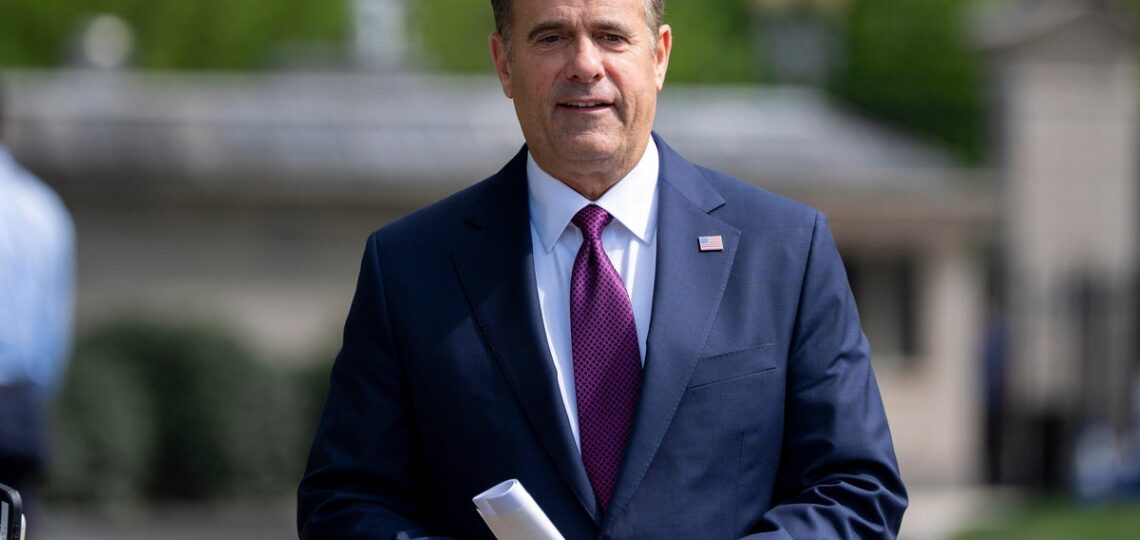
CIA Director Ratcliffe “strongly supports” Gabbard declassification of sensitive documents, agency says
CIA Director John Ratcliffe “strongly supports the public release” this week of highly sensitive documents by Director of National Intelligence Tulsi Gabbard, according to a CIA spokesperson, who said Ratcliffe “initiated” the declassification process after he took the helm at the agency this year.
Gabbard’s office publicly released a report drafted in 2017 by Republicans on the House Intelligence Committee on Russian activity during the 2016 election, sparking concerns about risks to sensitive sources and methods. She said Wednesday that the document contained additional evidence that Obama administration officials “manufactured” a narrative about Russia’s actions that was designed to undercut President Trump.
Gabbard also declassified a swath of documents related to the 2016 election last Friday.
“CIA Director Ratcliffe strongly supports the public release of HPSCI’s report, which was the result of a process initiated by CIA and led by DNI Gabbard,” the CIA spokesperson said, using an abbreviation for the House Permanent Select Committee on Intelligence.
“This effort reflects Director Ratcliffe’s continued commitment to elevating the truth and bringing transparency to the American people and would not have been possible without his directive to return it to the committee,” the spokesperson added.
The House report, which the committee’s Republican staff finalized in December 2017 but updated through 2020, was so highly classified that it was stored at CIA headquarters before Ratcliffe sent it back to the House panel and ultimately toward public release, CBS News has learned.
The committee made it available to the Office of the Director of National Intelligence, or ODNI, according to an ODNI official with knowledge of the declassification process. Gabbard would normally have been required to consult with the intelligence agencies that had contributed sensitive information to the report before declassifying it, but Mr. Trump — who made the decision to declassify the document with relatively few redactions — was not under the same obligations, the official said.
The report was written in large part by then-committee staffer Kash Patel, now the FBI director, according to one current and one former official. It contained discussions about raw intelligence from a CIA source the agency had recruited in Russia, and questioned whether analysts had sufficiently taken into account the source’s motivations, proximity to Putin or potential bias towards Mr. Trump.
The CIA source’s information helped inform the January 2017 Intelligence Community Assessment, or ICA, which concluded in part that Russian President Vladimir Putin and the Russian government aspired to help then-candidate Donald Trump’s election chances by discrediting Secretary Clinton and publicly contrasting her unfavorably to him. The U.S. exfiltrated a CIA asset from Russia in 2017, CBS News previously confirmed.
That judgment within the ICA has vexed Mr. Trump for years and has been a key focus of Gabbard’s recent declassifications.
Gabbard has claimed the documents released by her office reveal a “treasonous conspiracy” by Obama-era officials to undermine Mr. Trump during his first term by alleging Russian efforts to help him win in 2016. Gabbard says she has forwarded the records to the Justice Department as part of a criminal referral.
Obama’s spokesperson Patrick Rodenbush called Gabbard’s accusations “bizarre” and “ridiculous” earlier this week.
The ICA’s judgement about Russian actions in 2016 was also the focus of a recent CIA internal review under Ratcliffe. Released earlier this month, that review contained far fewer of the sensitive details included in the House Republicans’ report and said the judgment on Putin’s preference for Trump should have been issued with moderate rather than high confidence. But it said it did not dispute the “quality and credibility” of the information.
The top Democrat on the Senate Intelligence Committee, Sen. Mark Warner, called the release of the House committee’s report by Gabbard “desperate and irresponsible.” He said it put highly sensitive sources at risk and could disincentivize potential spies from working for the U.S. government.
“Tell me how you’re going to recruit somebody to, in one of our adversarial nations, maybe work with us, if that information is carelessly thrown around,” Warner said to reporters on Wednesday.
Ratcliffe, who previously served on the House Intelligence Committee as a congressman from Texas, has said one of his primary objectives as CIA director would be to reinvigorate intelligence collection from human sources. Current and former national security officials have said intelligence provided by human sources, known as HUMINT, has dropped off in recent years, as surveillance technologies have become more sophisticated and ubiquitous.
Human sources — especially those with proximity to world leaders in adversarial countries like Russia, China and North Korea — are especially prized and especially rare, given how risky, if not life-threatening, it can be for them to provide information to a foreign intelligence agency. Information provided by human sources typically remains classified for decades, often up to 75 years, according to government classification rules.
At his Senate confirmation hearing in January, Ratcliffe said the recruitment of human spies by the CIA is “not where it needs to be.”
“I do want to spend time looking at that,” he said.
The CIA has recently released recruitment videos in multiple languages with the aim of enticing potential human sources in Iran, China and Russia to come forward.
and
contributed to this report.